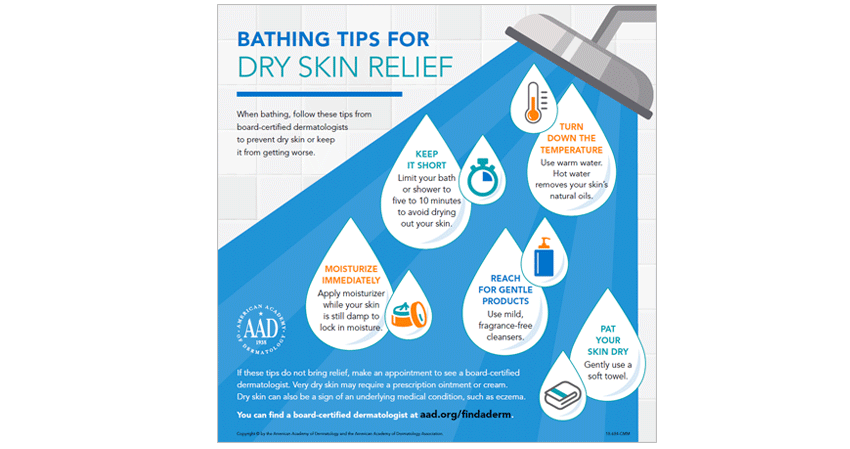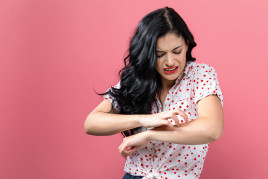Dermatologists' top tips for relieving dry skin
How to treat dry skin: Tips for relief
Dry skin can flake, itch, crack, and even bleed. To help relieve dry skin, dermatologists offer these tips.
Simple changes can soothe dry skin
Following the same skin care routine year-round may not work so well when the humidity drops. Without a change in your skin care, dry air can make fine lines and wrinkles more noticeable. Dry, itchy skin can flake, crack, and even bleed.
To help heal dry skin and prevent its return, dermatologists recommend the following.
Use 5- to 10-minute baths and showers to hydrate your dry skin. When the humidity drops or your skin feels dry, be sure to:
- Use warm rather than hot water.
Apply moisturizer immediately after washing. Ointments, creams, and lotions (moisturizers) work by trapping existing moisture in your skin. To trap this much-needed moisture, you need to apply a moisturizer within few minutes of:
Use an ointment or cream rather than a lotion. Ointments and creams are more effective and less irritating than lotions. Look for a cream or ointment that contains one or more of the following ingredients:
- Jojoba oil
- Dimethicone
- Glycerin
- Hyaluronic acid
- Lactic acid
- Lanolin
- Mineral oil
- Petrolatum
- Shea butter
Tip
To relieve dry hands, carry a non-greasy hand cream with you and apply it after each hand washing.
Wear lip balm or apply petroleum jelly to your lips. When choosing a lip balm, pick one that feels good on your lips. If your lips sting or tingle after you apply the lip balm, switch to one that does not cause this reaction.
Use only gentle, fragrance-free skin care products. Some skin care products, such as deodorant soaps, are too harsh for dry, sensitive skin. Dermatologists recommend using products labeled "fragrance-free."
If you see the word "unscented," the product can contain chemicals that neutralize or hide the odors of other ingredients. These chemicals can irritate dry, sensitive skin.Dry skin? Stop using skin care products that contain any of the following:
Alcohol (except for hand sanitizer)
Fragrance, including deodorant soaps
Retinoids
Avoiding these products will help your skin retain its natural oils.
Wear gloves. Our hands are often the first place we notice dry skin. You can reduce dry, raw skin by putting on gloves before you:
Choose non-irritating clothes and laundry detergent. When our skin is dry and raw even clothes and laundry detergent can be irritating. To avoid this:
Stay warm without cozying up to a fireplace or other heat source. Sitting in front of an open flame or other heat source can dry your skin.
Add moisture to the air. Plug in a humidifier. If you can, check your home heating system to find out if you have a humidifier on the system — and whether it’s working.

When to see a board-certified dermatologist
Your skin should start to feel better quickly. If these changes do not bring relief, you may want to see a dermatologist. Very dry skin can require a prescription ointment or cream. Dry skin also can be a sign of a skin condition that needs treatment. A dermatologist can examine your skin and explain what can help reduce your discomfort.
Have a skin, hair, or nail problem?
No one understands your skin better than a board-certified dermatologist. Partner with the expert for the best care.
Related AAD resources
Images
Video and infographic property of the American Academy of Dermatology.
Written by:
Paula Ludmann, MS
Reviewed by:
Sandy Marchese Johnson, MD, FAAD
William Warren Kwan, MD, FAAD
Sanna Ronkainen, MD, FAAD
Desmond Shipp, MD, FAAD
Last updated: 5/16/24
 Atopic dermatitis: More FDA-approved treatments
Atopic dermatitis: More FDA-approved treatments
 Biosimilars: 14 FAQs
Biosimilars: 14 FAQs
 How to trim your nails
How to trim your nails
 Relieve uncontrollably itchy skin
Relieve uncontrollably itchy skin
 Fade dark spots
Fade dark spots
 Untreatable razor bumps or acne?
Untreatable razor bumps or acne?
 Tattoo removal
Tattoo removal
 Scar treatment
Scar treatment
 Free materials to help raise skin cancer awareness
Free materials to help raise skin cancer awareness
 Dermatologist-approved lesson plans, activities you can use
Dermatologist-approved lesson plans, activities you can use
 Find a Dermatologist
Find a Dermatologist
 What is a dermatologist?
What is a dermatologist?
